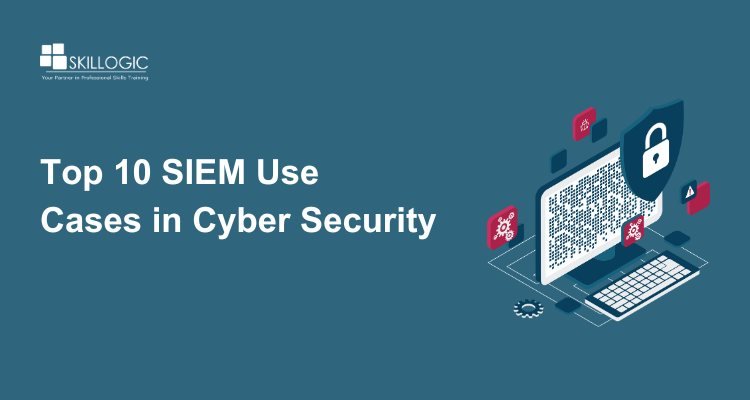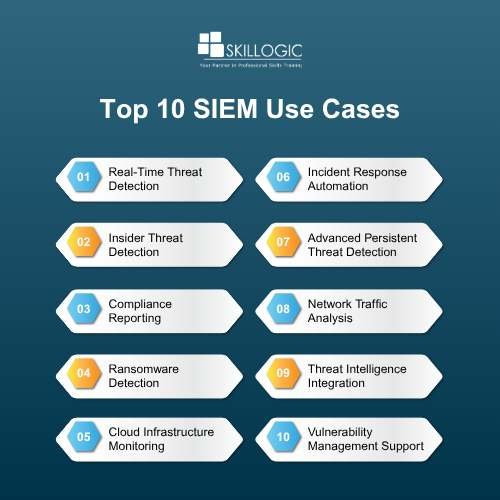Top 10 SIEM Use Cases in Cyber Security
Discover the top 10 SIEM use cases in cyber security, from real-time threat detection to compliance. Learn how SIEM tools enhance security operations.

As cyber threats continue to evolve, organizations are under increasing pressure to strengthen their digital defenses. One of the most powerful tools in an enterprise's security arsenal is SIEM in cyber security, a system that enables the collection, analysis, and response to security data in real time. From threat detection to compliance reporting, Security Information and Event Management (SIEM) plays a critical role in modern IT infrastructure.
Here, we will explore the top SIEM use cases in cyber security and how organizations leverage SIEM tools to gain visibility, respond faster, and protect sensitive assets.
What is SIEM in Cyber Security
SIEM in cyber security refers to a centralized platform that aggregates and analyzes log data from across an organization's systems. It combines Security Information Management (SIM) and Security Event Management (SEM) to provide real-time event monitoring, correlation, and incident response.
By using SIEM tools, security teams can detect threats that may go unnoticed when systems operate in silos. Modern SIEM applications incorporate advanced features like user behavior analytics (UBA), machine learning, and threat intelligence feeds to enhance detection accuracy and reduce false positives.
According to IBM Cost of a Data Breach Report, organizations using SIEM monitoring and automated threat detection reduced breach costs by an average of $1.76 million compared to those without such systems.
Refer these articles:
- Authentication vs Authorization: Key Differences
- What is Spoofing in Cyber Security and How to Protect Against It
- Top Mobile Security Tips in 2025 to Protect Your Smartphone
Key Benefits of Using SIEM in Cyber Security
Deploying SIEM in cyber security offers several benefits for organizations of all sizes. These include:
- Centralized Visibility: SIEM consolidates security data, making it easier to monitor across endpoints, servers, and applications. This unified view helps security teams identify and respond to threats more effectively and in real time.
- Faster Threat Detection: It correlates events from multiple sources to identify patterns indicative of malicious behavior. By analyzing logs and user behavior, SIEM detects anomalies that might signal an attack in progress.
- Regulatory Compliance: SIEM applications simplify auditing and reporting requirements for regulations like GDPR, HIPAA, and PCI DSS. Automated compliance reports reduce manual work and ensure organizations meet legal obligations efficiently.
- Reduced Incident Response Time: Through automation and alerting, SIEM tools help respond to incidents more swiftly. Predefined playbooks and workflows allow faster containment and resolution of security events.
- Operational Efficiency: Security teams can prioritize and manage alerts efficiently using dashboards and risk scoring. This helps reduce alert fatigue and allows analysts to focus on the most critical threats.
The benefits of SIEM are not just theoretical and a survey found that 78% of organizations using SIEM reported faster incident response and improved ROI on their cyber security investments.
Refer these articles:
- How much is the Cyber Security Course Fee in Coimbatore
- How to Succeed in a Cybersecurity Career in Coimbatore: Skills, Salaries, and Insights
- How to choose best institute for cyber security in coimbatore
Top 10 SIEM Use Cases for Enhanced Cyber Security
Here are the top SIEM use cases that demonstrate the real-world applications and impact of SIEM in cyber security:

1. Real-Time Threat Detection
SIEM enables real-time monitoring of suspicious activities such as brute force attempts, malware infections, or lateral movement. This allows security teams to act before the threat escalates.
2. Insider Threat Detection
By analyzing user behavior patterns, SIEM detects anomalies that may suggest insider attacks, such as data exfiltration or unauthorized access to sensitive systems. It provides behavioral baselines and flags deviations that traditional security tools often miss
3. Compliance Reporting
SIEM in cyber security automates compliance with mandates like SOX, ISO 27001, and PCI DSS by maintaining logs and generating required reports, reducing manual effort. This ensures organizations avoid penalties and maintain continuous audit readiness.
4. Ransomware Detection
SIEM tools detect ransomware early by correlating file access anomalies, privilege escalations, and known malware signatures, minimizing downtime and damage. Early detection enables faster containment, stopping encryption before it spreads.
5. Cloud Infrastructure Monitoring
With the rise in cloud adoption, SIEM applications monitor platforms like AWS, Azure, and Google Cloud for misconfigurations, unauthorized access, and API abuse. It ensures cloud environments remain secure, compliant, and properly configured.
6. Incident Response Automation
Using playbooks and orchestration features, SIEM helps automate response actions such as blocking IPs, disabling accounts, or isolating endpoints. This dramatically reduces response time and limits the window of exposure.
7. Advanced Persistent Threat Detection
Security Information and Event Management systems identify slow, stealthy APTs through correlation of unusual but seemingly benign events over time. They offer visibility into low-and-slow attacks that are designed to evade detection.
8. Network Traffic Analysis
SIEM monitoring inspects network traffic for anomalies like unusual port activity, DNS tunneling, or data spikes that may signal a compromise. It enhances situational awareness and supports deeper forensic investigation.
9. Threat Intelligence Integration
SIEM platforms integrate with threat intelligence feeds to enrich alerts and identify known indicators of compromise (IOCs), improving detection speed and accuracy. This proactive approach helps anticipate and mitigate emerging threats more effectively.
10. Vulnerability Management Support
By correlating scan results with system logs, SIEM helps prioritize vulnerabilities that are actively being exploited, enabling better patching strategies. It focuses resources on the most critical threats, improving remediation efficiency. A recent Ponemon Institute study revealed that organizations with mature SIEM monitoring and use case implementation reduced threat dwell time by 40% and improved attack containment time by 37%.
In short, the role of SIEM in cyber security is more critical than ever as organizations face an increasingly complex threat landscape. From threat detection to compliance and automation, Security Information and Event Management platforms are key to building a resilient security framework.
Whether managing cloud or hybrid environments, leveraging top SIEM use cases helps security teams stay ahead of threats and reduce risks. To maximize the value of SIEM tools, organizations must continuously adapt their SIEM applications to evolving threats and business needs, ensuring proactive, efficient, and effective security operations.
If you're planning to launch or advance your career in cyber security, choosing the right city and training program can significantly shape your professional journey. Coimbatore, is rapidly emerging as a dynamic hub for IT innovation and technical education. With its expanding IT infrastructure, premier engineering institutions, and a strong base of tech-driven enterprises and startups, Coimbatore now stands shoulder-to-shoulder with major metros like Chennai, Bengaluru, and Hyderabad as a strategic location for cyber security learning.
Opting for an offline cyber security course in Coimbatore gives learners the advantage of practical, hands-on exposure through live classroom training and real-time lab environments. These instructor-led sessions bridge the gap between theory and practice, preparing students to confidently tackle real-world cyber threats and security challenges.
SKILLOGIC’s Cyber Security Professional Plus Program is now available in Coimbatore, offering a cutting-edge curriculum aligned with the latest industry requirements. The program covers essential topics such as ethical hacking, penetration testing, risk assessment, digital forensics, and the application of AI and big data in cyber security. Backed by accreditations from NASSCOM FutureSkills and IIFIS, the course ensures learners are industry-ready and globally competitive.
Participants benefit from expert mentorship, 24/7 access to cloud-based lab platforms, and internationally recognized certifications. Whether you're a college graduate entering the tech industry or an IT professional upskilling in cyber defense, this cyber security course in Coimbatore provides the knowledge, tools, and confidence to build a successful career in today’s digital-first world.

0
283